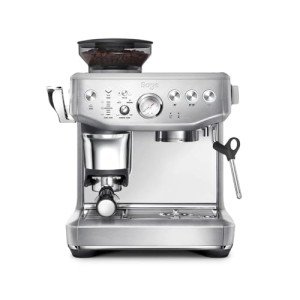Home Use Espresso Machines: A Comprehensive Guide
Espresso machines have ended up being a staple in many households as coffee lovers look for to duplicate café-quality brews in the convenience of their kitchens. The increase in appeal has resulted in a diverse market filled with various designs, features, and rates. Commercial Espresso Machines aims to offer an informative summary of home use espresso machines, helping readers browse their alternatives effectively.
Comprehending Espresso Machines
Espresso machines work by forcing warm water through finely-ground coffee under high pressure, resulting in a concentrated coffee beverage referred to as espresso. There are numerous types of espresso machines classified based on their developing techniques and level of automation. The most common types include:
- Manual Espresso Machines: These need the user to manage the pressure and water flow, permitting a more hands-on coffee-making experience.
- Semi-Automatic Espresso Machines: These provide automatic control over water pressure, while the user by hand grinds and tamps the coffee.
- Automatic Espresso Machines: With the push of a button, these machines automatically control the flow of water, making it much easier to brew espresso with consistent outcomes.
- Super-Automatic Espresso Machines: These all-in-one machines handle grinding, tampering, brewing, and even milk frothing, making them perfect for users searching for convenience.
- Pill or Pod Machines: These use pre-packaged coffee pods to produce espresso with very little effort, but they limit option in brewing methods and flavors.
Table: Comparison of Espresso Machine Types
| Type | Control Level | Relieve of Use | Cleaning Level | Suitable For |
|---|---|---|---|---|
| Manual | User-controlled | Moderate | High | Coffee perfectionists |
| Semi-Automatic | Partial automation | Moderate | Moderate | Home baristas |
| Automatic | Totally automated | Easy | Low | Hectic individuals |
| Super-Automatic | Fully automated | Extremely simple | Really low | Convenience seekers |
| Capsule/Pod | Completely automated | Really simple | Really low | Casual drinkers |
Key Features to Consider
When choosing a home use espresso machine, it's necessary to think about various features that can substantially affect the quality of espresso and user experience.
- Pressure: Look for machines that supply a minimum of 9 bars of pressure, as this is considered optimum for brewing espresso.
- Boiler Systems: Single vs. dual boiler systems identify temperature stability and the capability to brew espresso and steam milk all at once.
- Grinder: Integrated mills permit freshly ground coffee, which boosts taste. Consider machines with adjustable grind settings.
- Milk Frother: For those who enjoy coffees and lattes, an integrated steam wand or automatic frother is crucial.
- Size and Design: Consider your kitchen space and aesthetic choices. Machines can be found in different sizes, from compact to large setups.
- Rate: Home espresso machines can range from a few hundred to several thousand dollars, so it's important to establish a budget before checking out options.
Pros and Cons of Home Use Espresso Machines
| Pros | Cons |
|---|---|
| Convenience of developing coffee at home | Preliminary financial investment can be high |
| Quality of espresso is frequently superior | Needs some ability, particularly with manual machines |
| Capability to explore flavors | Maintenance and cleansing can be labor-intensive |
| Can conserve cash in the long run | Not all machines will match every coffee choice |
Upkeep and Cleaning Tips
Preserving an espresso machine is important for extending its life and guaranteeing constant brew quality. Here are some helpful pointers:
- Regular Descaling: Minerals from water can construct up in the machine. Descale every 1-3 months, depending on water firmness.
- Daily Cleaning: Rinse portafilters, baskets, and steam wands after each use to avoid coffee oils from constructing residue.
- Use Filtered Water: This can help in reducing mineral buildup and improve the taste of coffee.
- Replace Gaskets and Seals: These elements might wear gradually and needs to be replaced to preserve pressure and performance.
- Check out the Manual: Each machine has specific care instructions; following these will guarantee longevity.
Frequently Asked Questions About Home Use Espresso Machines
Q1: What is the very best budget espresso machine?The best budget espresso machine often depends upon individual requirements, but designs like the DeLonghi EC155 or the Breville Bambino are popular amongst users for offering great value. Q2: How long do home espresso machines generally last?With proper maintenance, home espresso machines can last anywhere from 5 to 15 years, depending on the quality of the machine and frequency of use. Q3: Can I make coffees and lattes with any espresso machine?While most espresso machines can make cappuccinos and lattes, having a dependable
steam wand or frother is essential for attaining the right milk texture.
Q4: Are super-automatic machines worth the investment?For those who prioritize benefit and fast brewing, super-automatic machines can be worth the financial investment, though they might do not have some customizability in brew strength and taste. see this page : What kinds of coffee beans are best for espresso?While personal preference plays a role, beans labeled as" espresso "blends are typically roasted darker, producing abundant tastes and a velvety texture when brewed.
Investing in a home espresso machine can change the everyday coffee regimen into something unique, elevating home brews to café quality. By understanding the various kinds of machines, crucial features to consider, maintenance requirements, and weighing the
pros and cons, consumers can make informed decisions that match their private preferences. As the espresso culture continues to grow, no matter the choice, every brew can be a tasty experience waiting to be savored.

